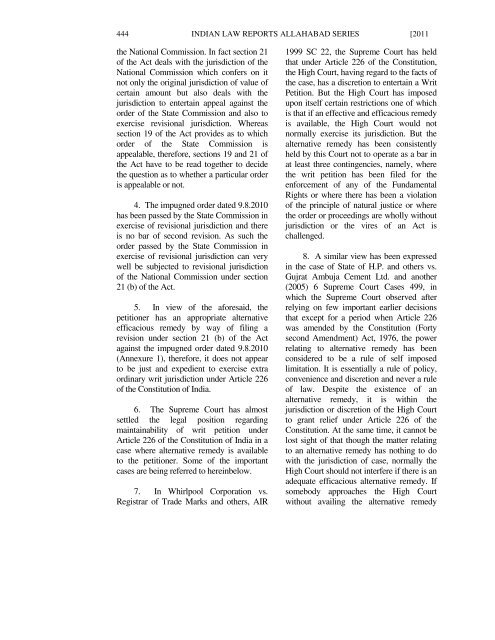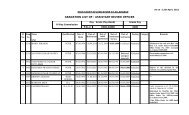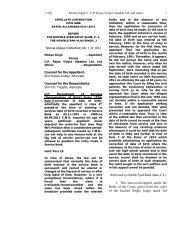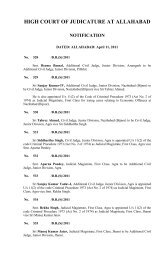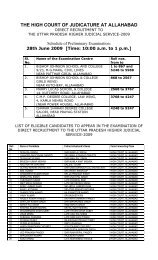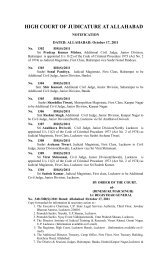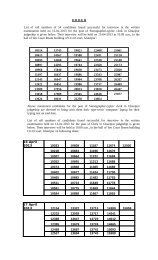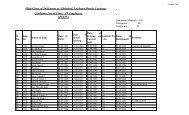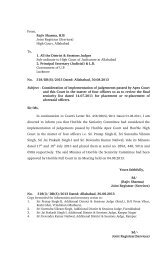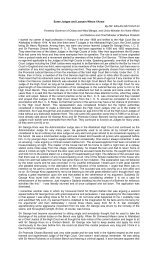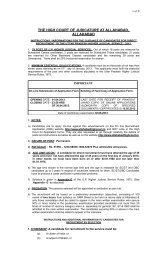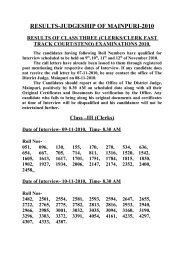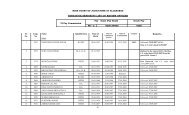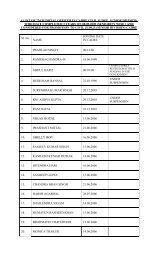Apr - High Court of Judicature at Allahabad
Apr - High Court of Judicature at Allahabad
Apr - High Court of Judicature at Allahabad
You also want an ePaper? Increase the reach of your titles
YUMPU automatically turns print PDFs into web optimized ePapers that Google loves.
444 INDIAN LAW REPORTS ALLAHABAD SERIES [2011<br />
the N<strong>at</strong>ional Commission. In fact section 21<br />
<strong>of</strong> the Act deals with the jurisdiction <strong>of</strong> the<br />
N<strong>at</strong>ional Commission which confers on it<br />
not only the original jurisdiction <strong>of</strong> value <strong>of</strong><br />
certain amount but also deals with the<br />
jurisdiction to entertain appeal against the<br />
order <strong>of</strong> the St<strong>at</strong>e Commission and also to<br />
exercise revisional jurisdiction. Whereas<br />
section 19 <strong>of</strong> the Act provides as to which<br />
order <strong>of</strong> the St<strong>at</strong>e Commission is<br />
appealable, therefore, sections 19 and 21 <strong>of</strong><br />
the Act have to be read together to decide<br />
the question as to whether a particular order<br />
is appealable or not.<br />
4. The impugned order d<strong>at</strong>ed 9.8.2010<br />
has been passed by the St<strong>at</strong>e Commission in<br />
exercise <strong>of</strong> revisional jurisdiction and there<br />
is no bar <strong>of</strong> second revision. As such the<br />
order passed by the St<strong>at</strong>e Commission in<br />
exercise <strong>of</strong> revisional jurisdiction can very<br />
well be subjected to revisional jurisdiction<br />
<strong>of</strong> the N<strong>at</strong>ional Commission under section<br />
21 (b) <strong>of</strong> the Act.<br />
5. In view <strong>of</strong> the aforesaid, the<br />
petitioner has an appropri<strong>at</strong>e altern<strong>at</strong>ive<br />
efficacious remedy by way <strong>of</strong> filing a<br />
revision under section 21 (b) <strong>of</strong> the Act<br />
against the impugned order d<strong>at</strong>ed 9.8.2010<br />
(Annexure 1), therefore, it does not appear<br />
to be just and expedient to exercise extra<br />
ordinary writ jurisdiction under Article 226<br />
<strong>of</strong> the Constitution <strong>of</strong> India.<br />
6. The Supreme <strong>Court</strong> has almost<br />
settled the legal position regarding<br />
maintainability <strong>of</strong> writ petition under<br />
Article 226 <strong>of</strong> the Constitution <strong>of</strong> India in a<br />
case where altern<strong>at</strong>ive remedy is available<br />
to the petitioner. Some <strong>of</strong> the important<br />
cases are being referred to hereinbelow.<br />
7. In Whirlpool Corpor<strong>at</strong>ion vs.<br />
Registrar <strong>of</strong> Trade Marks and others, AIR<br />
1999 SC 22, the Supreme <strong>Court</strong> has held<br />
th<strong>at</strong> under Article 226 <strong>of</strong> the Constitution,<br />
the <strong>High</strong> <strong>Court</strong>, having regard to the facts <strong>of</strong><br />
the case, has a discretion to entertain a Writ<br />
Petition. But the <strong>High</strong> <strong>Court</strong> has imposed<br />
upon itself certain restrictions one <strong>of</strong> which<br />
is th<strong>at</strong> if an effective and efficacious remedy<br />
is available, the <strong>High</strong> <strong>Court</strong> would not<br />
normally exercise its jurisdiction. But the<br />
altern<strong>at</strong>ive remedy has been consistently<br />
held by this <strong>Court</strong> not to oper<strong>at</strong>e as a bar in<br />
<strong>at</strong> least three contingencies, namely, where<br />
the writ petition has been filed for the<br />
enforcement <strong>of</strong> any <strong>of</strong> the Fundamental<br />
Rights or where there has been a viol<strong>at</strong>ion<br />
<strong>of</strong> the principle <strong>of</strong> n<strong>at</strong>ural justice or where<br />
the order or proceedings are wholly without<br />
jurisdiction or the vires <strong>of</strong> an Act is<br />
challenged.<br />
8. A similar view has been expressed<br />
in the case <strong>of</strong> St<strong>at</strong>e <strong>of</strong> H.P. and others vs.<br />
Gujr<strong>at</strong> Ambuja Cement Ltd. and another<br />
(2005) 6 Supreme <strong>Court</strong> Cases 499, in<br />
which the Supreme <strong>Court</strong> observed after<br />
relying on few important earlier decisions<br />
th<strong>at</strong> except for a period when Article 226<br />
was amended by the Constitution (Forty<br />
second Amendment) Act, 1976, the power<br />
rel<strong>at</strong>ing to altern<strong>at</strong>ive remedy has been<br />
considered to be a rule <strong>of</strong> self imposed<br />
limit<strong>at</strong>ion. It is essentially a rule <strong>of</strong> policy,<br />
convenience and discretion and never a rule<br />
<strong>of</strong> law. Despite the existence <strong>of</strong> an<br />
altern<strong>at</strong>ive remedy, it is within the<br />
jurisdiction or discretion <strong>of</strong> the <strong>High</strong> <strong>Court</strong><br />
to grant relief under Article 226 <strong>of</strong> the<br />
Constitution. At the same time, it cannot be<br />
lost sight <strong>of</strong> th<strong>at</strong> though the m<strong>at</strong>ter rel<strong>at</strong>ing<br />
to an altern<strong>at</strong>ive remedy has nothing to do<br />
with the jurisdiction <strong>of</strong> case, normally the<br />
<strong>High</strong> <strong>Court</strong> should not interfere if there is an<br />
adequ<strong>at</strong>e efficacious altern<strong>at</strong>ive remedy. If<br />
somebody approaches the <strong>High</strong> <strong>Court</strong><br />
without availing the altern<strong>at</strong>ive remedy


